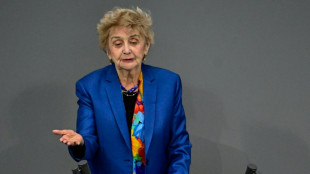
-
 Rockets veteran Adams out for rest of NBA season
Rockets veteran Adams out for rest of NBA season
-
Holders PSG happy to take 'long route' via Champions League play-offs

-
 French Senate adopts bill to return colonial-era art
French Senate adopts bill to return colonial-era art
-
Allrounder Molineux named Australian women's cricket captain

-
 Sabalenka faces Svitolina roadblock in Melbourne final quest
Sabalenka faces Svitolina roadblock in Melbourne final quest
-
Barcelona rout Copenhagen to reach Champions League last 16

-
 Liverpool, Man City and Barcelona ease into Champions League last 16
Liverpool, Man City and Barcelona ease into Champions League last 16
-
Tesla profits tumble on lower EV sales, AI spending surge

-
 Real Madrid face Champions League play-off after Benfica loss
Real Madrid face Champions League play-off after Benfica loss
-
LA mayor urges US to reassure visiting World Cup fans

-
 Madrid condemned to Champions League play-off after Benfica loss
Madrid condemned to Champions League play-off after Benfica loss
-
Meta shares jump on strong earnings report

-
 Haaland ends barren run as Man City reach Champions League last 16
Haaland ends barren run as Man City reach Champions League last 16
-
PSG and Newcastle drop into Champions League play-offs after stalemate

-
 Salah ends drought as Liverpool hit Qarabag for six to reach Champions League last 16
Salah ends drought as Liverpool hit Qarabag for six to reach Champions League last 16
-
Barca rout Copenhagen to reach Champions League last 16

-
 Arsenal complete Champions League clean sweep for top spot
Arsenal complete Champions League clean sweep for top spot
-
Kolo Muani and Solanke send Spurs into Champions League last 16

-
 Bayern inflict Kane-ful Champions League defeat on PSV
Bayern inflict Kane-ful Champions League defeat on PSV
-
Pedro double fires Chelsea into Champions League last 16, dumps out Napoli

-
 US stocks move sideways, shruggging off low-key Fed meeting
US stocks move sideways, shruggging off low-key Fed meeting
-
US capital Washington under fire after massive sewage leak

-
 Anti-immigration protesters force climbdown in Sundance documentary
Anti-immigration protesters force climbdown in Sundance documentary
-
US ambassador says no ICE patrols at Winter Olympics

-
 Norway's Kristoffersen wins Schladming slalom
Norway's Kristoffersen wins Schladming slalom
-
Springsteen releases fiery ode to Minneapolis shooting victims

-
 Brady latest to blast Belichick Hall of Fame snub
Brady latest to blast Belichick Hall of Fame snub
-
Trump battles Minneapolis shooting fallout as agents put on leave

-
 SpaceX eyes IPO timed to planet alignment and Musk birthday: report
SpaceX eyes IPO timed to planet alignment and Musk birthday: report
-
White House, Slovakia deny report on Trump's mental state

-
 Iran vows to resist any US attack, insists ready for nuclear deal
Iran vows to resist any US attack, insists ready for nuclear deal
-
Colombia leader offers talks to end trade war with Ecuador

-
 Former Masters champ Reed returning to PGA Tour from LIV
Former Masters champ Reed returning to PGA Tour from LIV
-
US Fed holds interest rates steady, defying Trump pressure

-
 Norway's McGrath tops first leg of Schladming slalom
Norway's McGrath tops first leg of Schladming slalom
-
Iraq PM candidate Maliki denounces Trump's 'blatant' interference

-
 Neil Young gifts music to Greenland residents for stress relief
Neil Young gifts music to Greenland residents for stress relief
-
Rubio upbeat on Venezuela cooperation but wields stick

-
 'No. 1 fan': Rapper Minaj backs Trump
'No. 1 fan': Rapper Minaj backs Trump
-
Fear in Sicilian town as vast landslide risks widening

-
 'Forced disappearance' probe opened against Colombian cycling star Herrera
'Forced disappearance' probe opened against Colombian cycling star Herrera
-
Seifert, Santner give New Zealand consolation T20 win over India

-
 King Charles III warns world 'going backwards' in climate fight
King Charles III warns world 'going backwards' in climate fight
-
Minneapolis activists track Trump's immigration enforcers

-
 Court orders Dutch to protect Caribbean island from climate change
Court orders Dutch to protect Caribbean island from climate change
-
Sterling agrees Chelsea exit after troubled spell

-
 Rules-based trade with US is 'over': Canada central bank head
Rules-based trade with US is 'over': Canada central bank head
-
Lucas Paqueta signs for Flamengo in record South American deal

-
 Holocaust survivor urges German MPs to tackle resurgent antisemitism
Holocaust survivor urges German MPs to tackle resurgent antisemitism
-
'Extraordinary' trove of ancient species found in China quarry


The US towns that took on 'forever chemical' giants -- and won
No corner of Earth is untouched. From Tibet to Antarctica, so-called "forever chemicals" have seeped into the blood of nearly every living creature.
Tainting food, water and wildlife, these toxic substances have been linked to ailments ranging from birth defects to rare cancers.
Yet if it weren't for the efforts of residents in two heavily impacted American towns, the world might still be in the dark.
In the new book "They Poisoned the World: Life and Death in the Age of Chemicals," investigative journalist Mariah Blake recounts how people in Parkersburg, West Virginia, and Hoosick Falls, New York, blew the whistle on the industrial giants that poisoned them -- and, in the process, forced the world to reckon with per‑ and polyfluoroalkyl substances, or PFAS.
"We're talking about a class of chemicals that doesn't break down in the environment," Blake tells AFP, calling it the "worst contamination crisis in human history."
First developed in the 1930s, PFAS are prized for their strength, heat resistance, and water- and grease-repelling powers. Built on the carbon-fluoride bond -- the strongest in chemistry -- they persist like radioactive waste and accumulate in our bodies, hence the "forever" nickname.
Blake's research traces their history, from accidental discovery by a DuPont chemist to modern usage in cookware, clothing, and cosmetics.
They might have remained a curiosity if Manhattan Project scientists hadn't needed a coating that could withstand atomic-bomb chemistry, helping companies produce them at scale.
- Corporate malfeasance -
Industry knew the risks early. Internal tests showed plant workers suffered chemical burns and respiratory distress. Crops withered and livestock died near manufacturing sites.
So how did they get away with it? Blake tracks the roots to the 1920s, when reports emerged that leaded gasoline caused psychosis and death among factory workers. In response, an industry-backed scientist advanced a now-infamous doctrine: chemicals should be presumed safe until proven harmful.
This "Kehoe principle" incentivized corporations to manufacture doubt around health risks -- a big reason it took until last year for the US to finalize a ban on asbestos.
DuPont's own studies warned that Teflon had no place on cookware. But after a French engineer coated his wife's muffin tins with it, a Parisian craze took off -- and an American entrepreneur sold the idea back to DuPont.
Soon nonstick pans were flying off shelves, thanks in part to a regulatory gap: PFAS, along with thousands of other chemicals, were "grandfathered" into the 1976 Toxic Substances Control Act and required no further testing.
- Massive litigation -
The cover-up began to unravel in the 1990s in Parkersburg, where DuPont had for decades been dumping Teflon waste into pits and the Ohio River.
The town reaped economic benefits, but female plant workers were having babies with birth defects, a cattle farmer downstream was losing his herd, and residents developed rare cancers.
Blake tells the story through "accidental activists." One is Michael Hickey, a preppy insurance underwriter with no interest in politics or the environment. After cancer took his father and friends, he started testing Hoosick Falls's water.
Another is Emily Marpe, "a teen mom with a high school education" who saved to buy her family's dream house in upstate New York, only to learn the water flowing from the taps was fouled with PFAS that now coursed through their blood in massive levels.
"She knew the science inside out," says Blake, "and became an incredibly articulate advocate."
Years of litigation yielded hundreds of millions in settlements and forced DuPont and 3M to phase out two notorious PFAS. But the companies pivoted to substitutes like GenX -- later shown to be just as toxic.
Still, Blake argues the tide is turning. France has banned PFAS in many consumer goods, the EU is considering a ban, and in the US, states are moving to restrict PFAS in sludge fertilizer and food packaging.
Liabilities linked to the chemicals are driving major retailers from McDonald's to REI to pledge PFAS-free products.
Her optimism is tempered by the political climate. Just this week, the Trump administration announced the rollback of federal drinking water standards for four next-generation PFAS chemicals.
But she believes the momentum is real.
"Ordinary citizens who set out to protect their families and communities have really created this dramatic change," she says. "It's like climate change -- it feels intractable, but here's a case where people have made major headway."
D.Bachmann--VB



